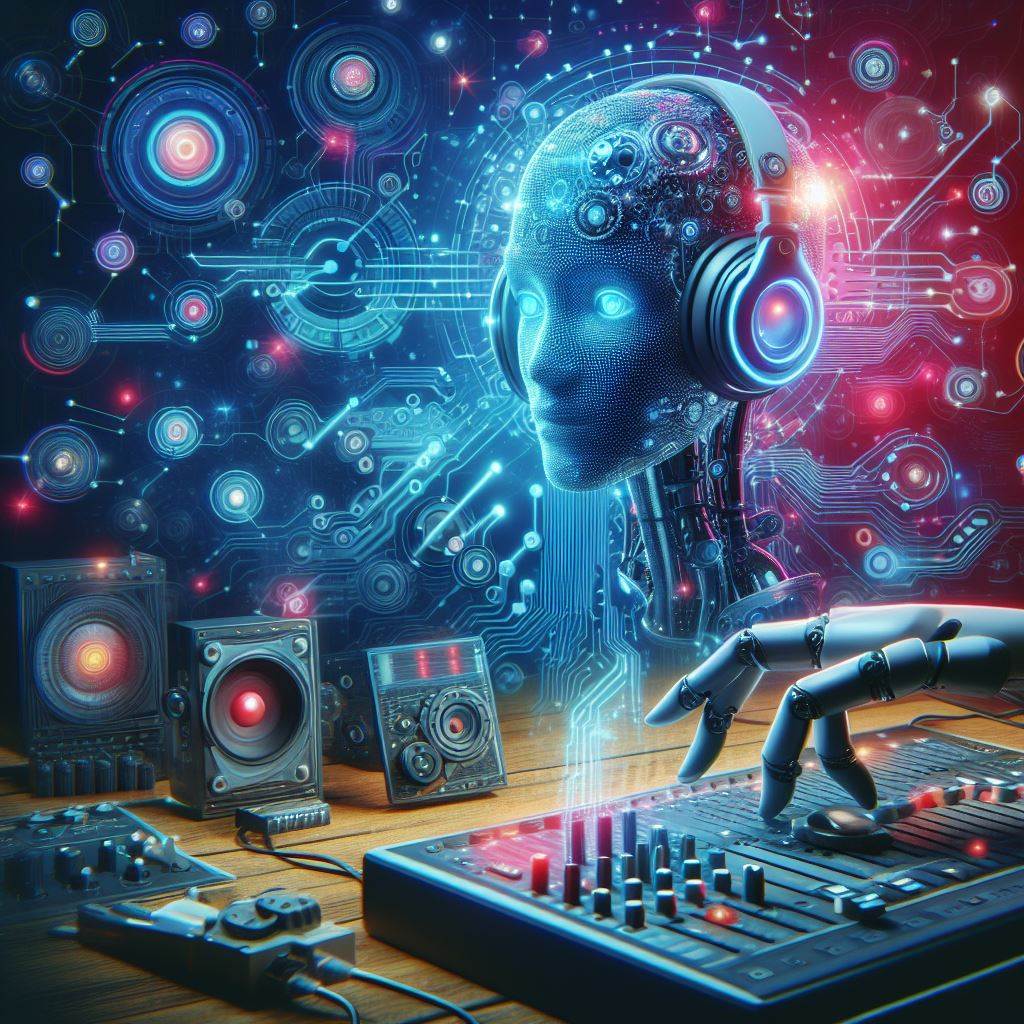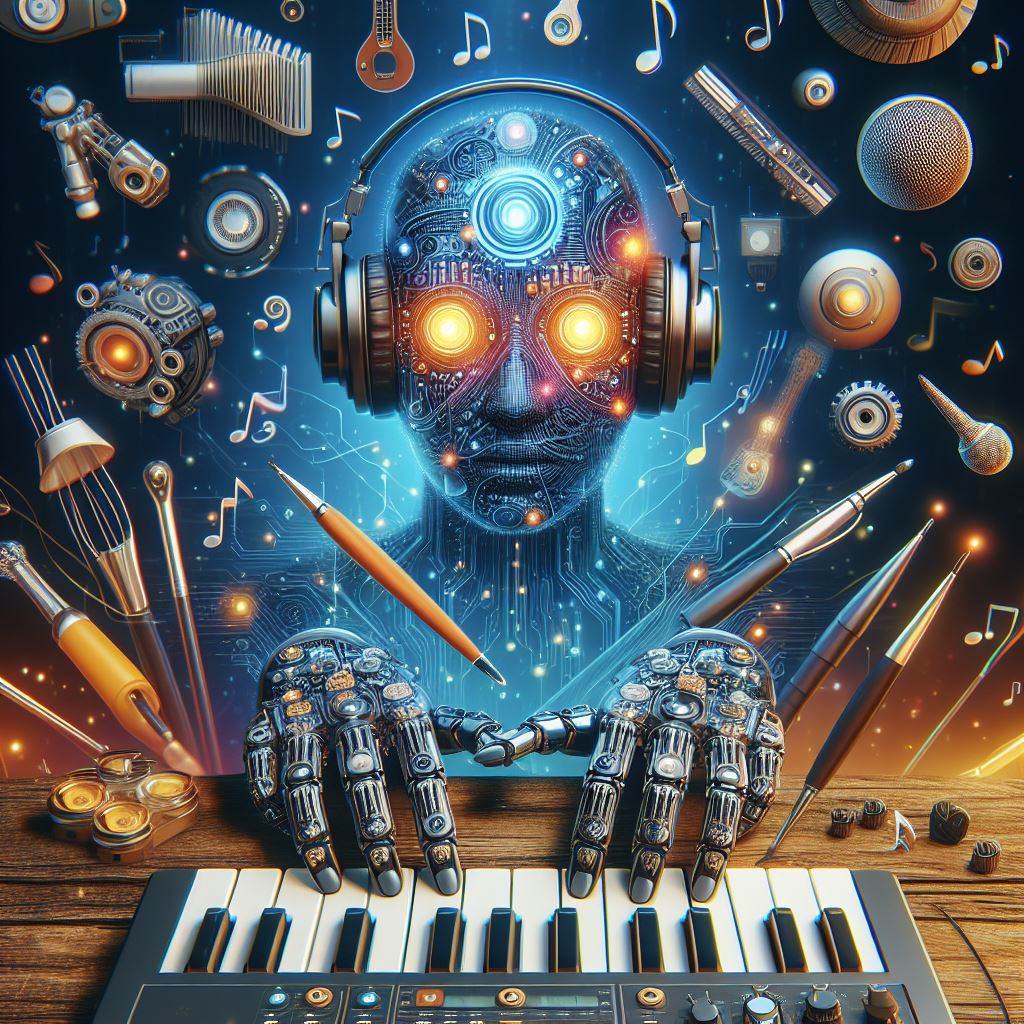Introduction
Hello, music lovers and audio enthusiasts! If you’re reading this, chances are you’re interested in how artificial intelligence (AI) tools are changing the game of music and audio production. And if you’re not, well, you should be, because AI tools are awesome and you’re missing out on a lot of fun and innovation.
AI tools are software applications that use machine learning, deep learning, natural language processing, computer vision, and other advanced technologies to perform tasks that normally require human intelligence, creativity, and skill. Sounds impressive, right? Well, it is, and it’s also very useful for music and audio production.
In this blog, I’m going to explore how AI tools are transforming various aspects of music and audio production, such as streaming, discovery, personalization, monetization, and licensing. I’ll also give you some examples of AI tools that you can try out for yourself, and some tips on how to use them effectively. So, buckle up and get ready for a musical journey with AI tools!
- Explain what AI tools are and how they are used in Music and audio production
- Provide some examples of AI tools for music and audio production, such as Amper Music, Aiva, LANDR, etc.
- State the main purpose and thesis of the blog: to explore how AI tools are transforming various aspects of music and audio production, such as streaming, discovery, personalization, monetization, and licensing
AI Music Streaming: How to Listen to Music Like a Boss
Music streaming is one of the most popular and convenient ways of listening to music and audio content. Whether you use Spotify, Apple Music, YouTube Music, or any other platform, you probably enjoy having access to millions of songs and podcasts at your fingertips. But do you know what makes music streaming even better? AI tools!
AI tools are enhancing the music streaming experience for both listeners and creators. For listeners, AI tools can generate personalized playlists, recommendations, and radio stations based on their preferences, mood, and context. For example, Spotify uses AI tools to create Discover Weekly, Release Radar, and Daily Mix playlists that match the listener’s taste and introduce them to new music. Apple Music uses AI tools to create personalized stations and playlists based on the listener’s listening history, genre preferences, and mood. YouTube Music uses AI tools to create Mixtape, Your Mix, and Discover Mix playlists that cater to the listener’s mood, activity, and location.
- Discuss how AI tools are enhancing the music streaming experience for both listeners and creators
- Explain how AI tools can generate personalized playlists, recommendations, and radio stations based on the listener’s preferences, mood, and context
- Explain how AI tools can help creators distribute their music to various streaming platforms, optimize their metadata, and analyze their performance and audience.
AI Music Discovery: How to Find Your Next Favorite Song
Music discovery is one of the most exciting and rewarding aspects of music and audio production. Whether you’re a listener or a creator, you probably love finding new music and audio content that resonates with you and inspires you. But do you know what makes music discovery even easier and more fun? AI tools!
AI tools are enabling new ways of discovering music and audio content. For listeners, AI tools can analyze the musical attributes and genres of songs and artists, and create similarity maps and clusters. For example, Aiva is an AI tool that helps listeners discover new music based on their musical preferences and tastes. It creates a musical DNA for each song and artist, and uses it to find similar and compatible music. Music Map is an AI tool that helps listeners discover new music based on their favorite artists. It creates a map of artists that are related by genre, style, and popularity.
- Discuss how AI tools are enabling new ways of discovering music and audio content
- Explain how AI tools can analyze the musical attributes and genres of songs and artists, and create similarity maps and clusters
- Explain how AI tools can help listeners discover new music and audio content based on their tastes, moods, activities, and interests
- Explain how AI tools can help creators discover new sounds, samples, loops, and effects to use in their music and audio production
AI Music Personalization: How to Make Music Your Own
Music personalization is one of the most empowering and satisfying aspects of music and audio production. Whether you’re a listener or a creator, you probably enjoy customizing your music and audio experience to suit your needs and preferences. But do you know what makes music personalization even more accessible and enjoyable? AI tools!
AI tools are empowering listeners and creators to personalize their music and audio experience. For listeners, AI tools can generate adaptive music and audio content that changes according to their feedback, context, and environment. For example, Endel is an AI tool that helps listeners create personalized soundscapes that adapt to their mood, activity, and location. It also syncs with their biometric data, such as heart rate and sleep cycles, to optimize their well-being and productivity. Moodify is an AI tool that helps listeners create personalized playlists that adapt to their mood and emotions. It also provides insights and tips on how to improve their mood and mental health.
- Discuss how AI tools are empowering listeners and creators to personalize their music and audio experience
- Explain how AI tools can generate adaptive music and audio content that changes according to the listener’s feedback, context, and environment
- Explain how AI tools can help listeners customize their music and audio preferences, such as volume, tempo, pitch, mood, etc.
- Explain how AI tools can help creators personalize their music and audio production, such as editing, mixing, mastering, etc.
AI Music Monetization: How to Make Money from Music
Music monetization is one of the most challenging and rewarding aspects of music and audio production. Whether you’re a listener or a creator, you probably appreciate the value and potential of music and audio content. But do you know what makes music monetization even more feasible and profitable? AI tools!
AI tools are creating new opportunities and challenges for monetizing music and audio content. For creators, AI tools can help them generate royalty-free music and audio content that they can sell or license to others. For example, Jukedeck is an AI tool that helps creators generate original music and audio tracks that they can use for their own projects or sell to others. It also provides tools and features to customize and edit their tracks. Epidemic Sound is an AI tool that helps creators license their music and audio tracks to various media platforms, such as YouTube, Facebook, Instagram, etc. It also provides tools and features to manage their licenses and royalties.
- Discuss how AI tools are creating new opportunities and challenges for monetizing music and audio content
- Explain how AI tools can help creators generate royalty-free music and audio content that they can sell or license to others
- Explain how AI tools can help creators monetize their music and audio content through various channels, such as streaming, advertising, sponsorship, crowdfunding, etc.
- Explain how AI tools can help creators protect their music and audio rights and revenues from piracy, plagiarism, and fraud
AI Music Licensing: How to Share Music with the World
Music licensing is one of the most complex and important aspects of music and audio production. Whether you’re a listener or a creator, you probably respect the rights and responsibilities of music and audio content. But do you know what makes music licensing even more simple and smooth? AI tools!
AI tools are simplifying and streamlining the music and audio licensing process. For creators, AI tools can help them register their music and audio content with various rights organizations and platforms, such as ASCAP, BMI, SoundExchange, etc. For example, Songtrust is an AI tool that helps creators register their music and audio content with over 50 rights organizations and platforms worldwide. It also provides tools and features to manage and collect their royalties and payments. DistroKid is an AI tool that helps creators register their music and audio content with various streaming platforms, such as Spotify, Apple Music, YouTube Music, etc. It also provides tools and features to manage and collect their royalties and payments.
- Discuss how AI tools are simplifying and streamlining the music and audio licensing process
- Explain how AI tools can help creators register their music and audio content with various rights organizations and platforms, such as ASCAP, BMI, SoundExchange, etc.
- Explain how AI tools can help creators manage their music and audio licenses and contracts, such as terms, fees, royalties, etc.
- Explain how AI tools can help creators find and connect with potential music and audio licensors and licensees, such as filmmakers, podcasters, advertisers, etc.

Conclusion
AI tools are revolutionizing music and audio production in many ways. They are enhancing the music streaming experience, enabling new ways of music discovery, empowering music personalization, creating new opportunities for music monetization, and simplifying the music licensing process. AI tools are not only making music and audio production more accessible and enjoyable, but also more innovative and impactful.
However, AI tools are not without their challenges and limitations. They still require human input, guidance, and supervision to ensure their quality, accuracy, and ethics. They also pose some risks and threats to the music and audio industry, such as plagiarism, piracy, and fraud. Therefore, it is important for listeners and creators to use AI tools responsibly and respectfully, and to keep learning and improving their skills and knowledge.
AI tools are not here to replace human creativity and intelligence, but to augment and complement them. AI tools are here to help us create and enjoy music and audio content in new and exciting ways. So, what are you waiting for? Try out some of the AI tools mentioned in this blog, or find your own, and see how they can transform your music and audio production. And don’t forget to share your feedback and experiences with us in the comments section below. Happy music making!
- Summarize the main points and findings of the blog
- Emphasize the benefits and impacts of AI tools for music and audio production
- Provide some future directions and challenges for AI tools for music and audio production
- End with a call to action or a question for the readers

